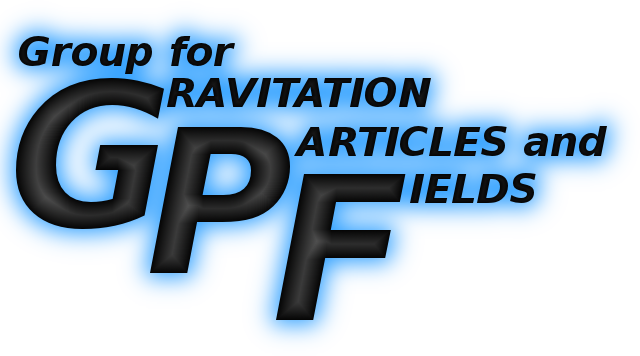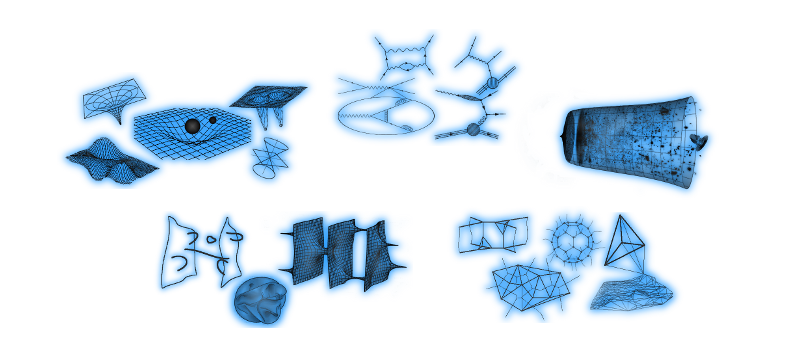


2018 Workshop on Gravity, Holography, Strings and Noncommutative Geometry
1. February 2018, Belgrade, Serbia
Organization
The Workshop is organized by Group for Gravitation, Particles and Fields (Institute of Physics, University of Belgrade), within the framework of the national project "Physical implications of modified spacetime", number ON 171031, of the Ministry of Education, Science and Technological Development, Serbia.
Scientific committee
Branislav Cvetkovic and Marko Vojinovic
Registration
It is important for all interested participants to register as soon as possible, so that we can reserve an appropriate number of places for lunch in the restaurant. Registration is now closed.
Programme
Lectures were held on Thursday, 1. February 2018, at the Institute of Physics, seminar room 360 (ex-room 300), third floor.
|
09:50 -- 10:00 --- Opening |
Introduction and opening of the workshop | |
|
10:00 -- 10:45 --- Lecture 10:45 -- 10:55 --- Discussion |
Speaker: Rodrigo Olea (lecture slides) |
Title: Brussels sprouts, black hole mass and pre-holography Abstract: We present the first evidence on the fact that topological invariants should renormalize anti-de Sitter gravity with quadratic-curvature corrections. This argument is based on the computation of energy for Einstein black holes in the theory, which appears as an alternative to linearized methods (e.g., Deser-Tekin formula). |
|
10:55 -- 11:40 --- Lecture 11:40 -- 11:50 --- Discussion |
Speaker: Olivera Miskovic (lecture slides) |
Title: Thermodynamic instabilities of extremal black holes Abstract: We study static, charged extremal black holes in 4D gravity non-linearly coupled to a scalar field. We show that the system can exhibit a phase transition due to electric charge variations only in presence of a cosmological constant and if the scalar is massive. A near-critical analysis reveals that, on one side of the critical point, the hairy black hole has larger entropy than the non-hairy one, thus giving rise to a zero temperature phase transition. Our results are analytical and based on the second law of thermodynamics. |
|
11:50 -- 12:10 --- Break |
Coffee break | |
|
12:10 -- 12:55 --- Lecture 12:55 -- 13:05 --- Discussion |
Speaker: Maria Pilar Garcia del Moral (lecture slides) |
Title: On global aspects of duality invariant theories: M2-brane versus double field theory Abstract: In this talk I will discuss the global description of a supermembrane compactified on a $T^2\times M_9$, where T^2 is the 2-dimensional torus and M_9 is a 9-dimensional noncompact spacetime. I will discuss the T-duality transformation of this model and compare global aspects of this construction with that of the double field theory. |
|
13:05 -- 13:50 --- Lecture 13:50 -- 14:00 --- Discussion |
Speaker: Mihailo Cubrovic (lecture slides) |
Title: Three tales on boundary action in AdS/CFT: Berry phases, gauge fields and non-canonical Hamiltonians Abstract: We argue that AdS/CFT dictionary can be extended by adding new subleading terms to the boundary (surface) part of the AdS action, under the constraint that the bulk equations of motion at semiclassical level remain unchanged. This corresponds to modifying the state space and/or the Poisson structure in dual field theory without additional sources/operator insertions. We give three applications of the general idea. The Berry phase is obtained from a subleading boundary term for the bulk fermion which transforms as a spin on the sphere, hence it is crucial to start from global AdS and subsequently take the planar limit. A phenomenological (bottom-up) description of dynamical gauge fields is encoded in a singleton excitation on the boundary, decoupled from the bulk. The Poisson structure, defined by the time evolution operator in CFT, is modified by sourcing multi-particle states in the bulk from appropriate boundary sources. This opens a way toward constructing the gravity dual of non-canonical Hamiltonians as encountered, e.g., in fluid advection. |
|
14:00 -- 16:00 --- Lunch |
Official workshop lunch at the IPB restaurant | |
|
16:00 -- 16:20 --- Lecture 16:20 -- 16:25 --- Discussion |
Speaker: Dejan Simic (lecture slides) |
Title: Near horizon of the OTT black hole, asymptotic symmetries and soft hair Abstract: We study near horizon geometry of extremal (non-)rotating Oliva-Tempo-Troncoso black hole. First we derive the corresponding geometries. Next, we analyze asymptotic structure and determine asymptotic symmetry, which consists of time reparametrization, chiral Virasoro and u(1) Kac-Moody algebra. In the end, interpretation in term of soft hair on the black hole is given. |
|
16:25 -- 16:45 --- Lecture 16:45 -- 16:50 --- Discussion |
Speaker: Biljana Nikolic (lecture slides) |
Title: Some geometrical aspects of NC SO(2,3)* gravity Abstract: We construct gravity action on the Moyal-Weyl spacetime as a noncommutative SO(2,3)* gauge theory and expand it, using the Seiberg-Witten map, up to the second order in the deformation parameter. After the braking of symmetry of obtained action down to SO(1,3) gauge symmetry, we analyze the low energy sector of the model. We calculate the equations of motion, and discuss the noncommutative corrections as the source of the curvature and torsion. We find one solution: the NC correction to Minkowski spacetime. Using this solution, we explain breaking of the diffeomorphism symmetry as a consequence of working in a particular coordinate system given by the Fermi normal coordinates. |
|
16:50 -- 17:10 --- Break |
Coffee break | |
|
17:10 -- 17:30 --- Lecture 17:30 -- 17:35 --- Discussion |
Speaker: Dragoljub Gocanin (lecture slides) |
Title: Birefringence property of the Moyal-Weyl noncommutative spacetime in SO(2,3)_* model Abstract: We demonstrate that flat noncommutative (NC) Moyal-Weyl spacetime acts as a birefringent medium for electrons propagating in it, and we present an action that predicts this "optical" effect. The action is obtained by NC Moyal-Weyl *-product deformation of a certain classical action invariant under local SO(2,3) transformations. After perturbative expansion via Seiberg-Witten map in powers of the deformation parameter θ and a suitable symmetry breaking down to the local Lorentz SO(1,3) symmetry, we get NC deformation of the Dirac action in curved spacetime with various new couplings. One of its significant features is the nonvanishing linear θ-correction which pertains even in flat spacetime. We analyse NC deformation of the Dirac equation and dispersion relation for electrons. The theory predicts Zeeman-like splitting of electron's undeformed (commutative) energy levels due to noncommutativity of the background spacetime. This splitting is helicity-dependent --- electrons with different helicity are affected differently by NC background. NC correction to the electron's energy levels is linear in θ, which brings us closer to the potential observation. |
|
17:35 -- 17:55 --- Lecture 17:55 -- 18:00 --- Discussion |
Speaker: Dragan Prekrat (lecture slides) |
Title: Phase transitions on the truncated Heisenberg space Abstract: We discuss the phase structure of matrix models on non-commutative spaces. We examine the connection between the geometry of the truncated Heisenberg space, the renormalizability and the striped phase and present the first numerical evidence of the modification of the phase diagram due to the coupling between the matrix field and the curvature. |
|
18:00 -- 18:30 --- Closing |
Final discussion and closing | |
List of participants
Last update: 2. February 2018, 22:55:12.